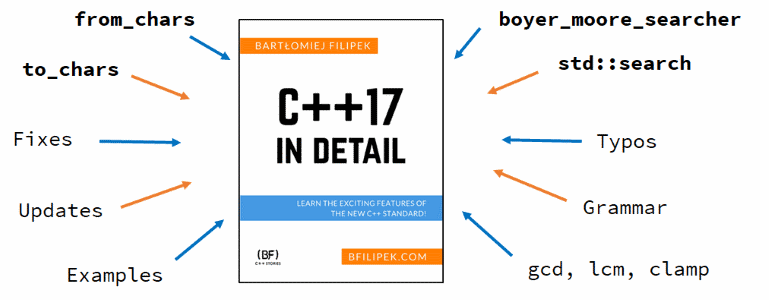MSVC (VS 2017 15.7, end of June 2018) is as far as I know the only major compiler/STL implementation that has parallel algorithms. Not everything is done, but you can use a lot of algorithms and apply std::execution::par on them!
Have a look at few examples I managed to run.
Introduction
Parallel algorithms look surprisingly simple from a user point of view. You have a new parameter - called execution policy - that you can pass to most of the std algorithms:
std::algorithm_name(policy,/* normal args... */);The general idea is that you call an algorithm and then you specify how it can be executed. Can it be parallel, maybe vectorized, or just serial.
We, as authors of the code, only know if there are any side effects, possible race conditions, deadlocks, or if there’s no sense in running it parallel (like if you have a small collection of items).
Execution Policies
The execution policy parameter will tell the algorithm how it should be executed. We have the following options:
sequenced_policy- is an execution policy type used as a unique type to disambiguate parallel algorithm overloading and require that a parallel algorithm’s execution may not be parallelized.- the corresponding global object is
std::execution::seq
- the corresponding global object is
parallel_policy- is an execution policy type used as a unique type to disambiguate parallel algorithm overloading and indicate that a parallel algorithm’s execution may be parallelized.- the corresponding global object is
std::execution::par
- the corresponding global object is
parallel_unsequenced_policy- is an execution policy type used as a unique type to disambiguate parallel algorithm overloading and indicate that a parallel algorithm’s execution may be parallelized and vectorized.- the corresponding global object is
std::execution::par_unseq
- the corresponding global object is
New algorithms
A lot of existing algorithms were updated and overloaded with the execution policy: See the full list here:
Extensions for parallelism - cppreference.com
And we got a few new algorithms:
for_each- similar tostd::for_eachexcept returnsvoid.for_each_n- applies a function object to the first n elements of a sequence.reduce- similar tostd::accumulate, except out of order execution.exclusive_scan- similar tostd::partial_sum, excludes the i-th input element from the i-th sum.inclusive_scan- similar tostd::partial_sum, includes the i-th input element in the i-th sumtransform_reduce- applies a functor, then reduces out of ordertransform_exclusive_scan- applies a functor, then calculates exclusive scantransform_inclusive_scan- applies a functor, then calculates inclusive scan
One of the most powerful algorithms is reduce (and also its form of transform_reduce). Briefly, the new algorithm provides a parallel version of std::accumulate.
Accumulate returns the sum of all the elements in a range (or a result of a binary operation that can be different than just a sum).
std::vector<int> v{1,2,3,4,5,6,7,8,9,10};
int sum = std::accumulate(v.begin(), v.end(),/*init*/0);The algorithm is sequential only; a parallel version will try to compute the final sum using a tree approach (sum sub-ranges, then merge the results, divide and conquer). Such method can invoke the binary operation/sum in a nondeterministic* order. Thus if binary_op is not associative or not commutative, the behaviour is also non-deterministic.
For example, you’ll get the same results for accumulate and reduce for a vector of integers (when doing a sum), but you might get a slight difference for a vector of floats or doubles. That’s because floating point operations are not associative.
transform_reduce will additionally invoke an operation on the input sequence and then perform reduction over the generated results.
MSVC Implementation
In the article: Announcing: MSVC Conforms to the C++ Standard | Visual C++ Team Blog
See the section New Features: Parallel Algorithms:
The following algorithms are parallelized.
- adjacent_difference, adjacent_find, all_of, any_of, count, count_if, equal, exclusive_scan, find, find_end, find_first_of, find_if, for_each, for_each_n, inclusive_scan, mismatch, none_of, reduce, remove, remove_if, search, search_n, sort, stable_sort, transform, transform_exclusive_scan, transform_inclusive_scan, transform_reduce
And we might expect more:
No apparent parallelism performance improvement on target hardware; all algorithms which merely copy or permute elements with no branches are typically memory bandwidth limited.
- copy, copy_backward, copy_n, fill, fill_n, move, move_backward, remove, remove_if, replace, replace_if, reverse, reverse_copy, rotate, rotate_copy, swap_rangesNot yet evaluated; parallelism may be implemented in a future release and is suspected to be beneficial.
- copy_if, includes, inplace_merge, is_heap, is_heap_until, is_partitioned, is_sorted, is_sorted_until, lexicographical_compare, max_element, merge, min_element, minmax_element, nth_element, partition_copy, remove_copy, remove_copy_if, replace_copy, replace_copy_if, set_difference, set_intersection, set_symmetric_difference, set_union, stable_partition, unique, unique_copy
Anyway, a lot of new algorithms are done, so we can play with reduce, sorting, counting, finding and more.
Examples
All code can be found in my repo:
https://github.com/fenbf/ParSTLTests
I have three examples:
- a benchmark with a few algorithms
- computing the size of the directory
- counting words in a string
A Basic Example
A simple benchmark:
std::vector<double> v(6000000,0.5);
RunAndMeasure("std::warm up",[&v]{
return std::reduce(std::execution::seq, v.begin(), v.end(),0.0);
});
RunAndMeasure("std::accumulate",[&v]{
return std::accumulate(v.begin(), v.end(),0.0);
});
RunAndMeasure("std::reduce, seq",[&v]{
return std::reduce(std::execution::seq, v.begin(), v.end(),0.0);
});
RunAndMeasure("std::reduce, par",[&v]{
return std::reduce(std::execution::par, v.begin(), v.end(),0.0);
});
RunAndMeasure("std::reduce, par_unseq",[&v]{
return std::reduce(std::execution::par_unseq, v.begin(), v.end(),0.0);
});
RunAndMeasure("std::find, seq",[&v]{
auto res = std::find(std::execution::seq, std::begin(v), std::end(v),0.6);
return res == std::end(v)?0.0:1.0;
});
RunAndMeasure("std::find, par",[&v]{
auto res = std::find(std::execution::par, std::begin(v), std::end(v),0.6);
return res == std::end(v)?0.0:1.0;
});RunAndMeasure is a helper function that runs a function and then prints the timings. Also, we need to make sure the result is not optimized away.
template<typenameTFunc>voidRunAndMeasure(constchar* title,TFunc func)
{
constauto start = std::chrono::steady_clock::now();
auto ret = func();
constauto end = std::chrono::steady_clock::now();
std::cout << title <<": "<<
std::chrono::duration <double, std::milli>(end - start).count()
<<" ms, res "<< ret <<"\n";
}On My machine (Win 10, i7 4720H, 4Cores/8Threads) I get the following results (in Release mode, x86)
std::warm up:4.35417 ms, res 3e+06
std::accumulate:6.14874 ms, res 3e+06
std::reduce, seq:4.07034 ms, res 3e+06
std::reduce, par:3.22714 ms, res 3e+06
std::reduce, par_unseq:3.0495 ms, res 3e+06
std::find, seq:5.13658 ms, res 0
std::find, par:3.20385 ms, res 0As you can see there’s some speed up!
Computing File Sizes
The below example is based on a code sample from C++17 - The Complete… by Nicolai Josutti.
Parallel algorithms - std::reduce is used to compute sizes of the files in a directory (using recursive scan). It’s a nice example of two C++17 features: parallelism and std::filesystem.
Here are the interesting parts of the code:
// Get all the available paths, recursively:
std::vector<std::filesystem::path> paths;
try{
std::filesystem::recursive_directory_iterator dirpos{ root };
std::copy(begin(dirpos), end(dirpos),
std::back_inserter(paths));
}
catch(const std::exception& e){
std::cerr <<"EXCEPTION: "<< e.what()<< std::endl;
return EXIT_FAILURE;
}Fetching all the paths is handled by so concise code!
For now std::copy cannot be used in a parallel way.
And the final computations:
template<typenamePolicy>
uintmax_tComputeTotalFileSize(const std::vector<std::filesystem::path>& paths,
Policy policy)
{
return std::transform_reduce(
policy,
paths.cbegin(), paths.cend(),// range
std::uintmax_t{0},// initial value
std::plus<>(),// accumulate ...
[](const std::filesystem::path& p){// file size if regular file
return is_regular_file(p)? file_size(p)
: std::uintmax_t{0};
});
}The main invocation:
start = std::chrono::steady_clock::now();
uintmax_tFinalSize=0;
if(executionPolicyMode)
FinalSize=ComputeTotalFileSize(paths, std::execution::par);
else
FinalSize=ComputeTotalFileSize(paths, std::execution::seq);
PrintTiming("computing the sizes", start);
std::cout <<"size of all "<< paths.size()
<<" regular files: "<<FinalSize/1024<<" kbytes\n";The “problem” I found is that the par and seq policies are not of the same type. That’s why I moved the code into a template function and then I could control it via the boolean flag.
Some results (running on the intermediate directory form the builds, 108 files, ~20MB total):
// parallel:
PS D:\github\ParSTLTests\Release>.\FileSizes.exe ..\IntDir\ 1
Using PAR Policy
gathering all the paths:0.74767 ms
number of files:108
computing the sizes:0.655692 ms
size of all 108 regular files:20543 kbytes
// sequential:
PS D:\github\ParSTLTests\Release>.\FileSizes.exe ..\IntDir\ 0
Using SEQ Policy
gathering all the paths:0.697142 ms
number of files:108
computing the sizes:1.0994 ms
size of all 108 regular files:20543 kbytesFor this test, I got 1.0994 ms vs 0.655692 ms - in favour of the PAR version.
Counting Words in a String
The below example comes from Bryce Lelbach's talk about parallel algorithms:
The C++17 Parallel Algorithms Library and Beyond
He showed an interesting way of computing the word count:
- In the first phase we transform text into
1and0. We want to have1in the place where a word starts and0in all other places.- If we have a string
"One Two Three"then we want to generate an array1000100010000.
- If we have a string
- Then we can reduce the computed array of
1and0- the generated sum is the number of words in a string.
This looks like a “natural” example where transform_reduce might be used:
bool is_word_beginning(char left,char right)
{
return std::isspace(left)&&!std::isspace(right);
}
template<typenamePolicy>
std::size_t word_count(std::string_view s,Policy policy)
{
if(s.empty())
return0;
std::size_t wc =(!std::isspace(s.front())?1:0);
wc += std::transform_reduce(policy,
s.begin(),
s.end()-1,
s.begin()+1,
std::size_t(0),
std::plus<std::size_t>(),
is_word_beginning);
return wc;
}Here’s a benchmark code:
constint COUNT = argc >1? atoi(argv[1]):1'000'000;
std::string str(COUNT,'a');
for(int i =0; i < COUNT;++i)
{
if(i %5==0|| i %17==0)
str[i]='';// add a space
}
std::cout <<"string length: "<< COUNT <<", first 60 letters: \n";
std::cout << str.substr(0,60)<< std::endl;
RunAndMeasure("word_count seq",[&str]{
return word_count(str, std::execution::seq);
});
RunAndMeasure("word_count par",[&str]{
return word_count(str, std::execution::par);
});
RunAndMeasure("word_count par_unseq",[&str]{
return word_count(str, std::execution::par_unseq);
});And some results:
PS D:\github\ParSTLTests\Release>.\WordCount.exe
string length:1000000, first 60 letters:
aaaa aaaa aaaa a aa aaaa aaaa aaa aaaa aaaa aaaa aaa aaaa
word_count seq:3.44228 ms, res 223529
word_count par:1.46652 ms, res 223529
word_count par_unseq:1.26599 ms, res 223529
PS D:\github\ParSTLTests\Release>.\WordCount.exe 20000000
string length:20000000, first 60 letters:
aaaa aaaa aaaa a aa aaaa aaaa aaa aaaa aaaa aaaa aaa aaaa
word_count seq:69.1271 ms, res 4470588
word_count par:23.342 ms, res 4470588
word_count par_unseq:23.0487 ms, res 4470588
PS D:\github\ParSTLTests\Release>.\WordCount.exe 50000000
string length:50000000, first 60 letters:
aaaa aaaa aaaa a aa aaaa aaaa aaa aaaa aaaa aaaa aaa aaaa
word_count seq:170.858 ms, res 11176471
word_count par:59.7102 ms, res 11176471
word_count par_unseq:62.2734 ms, res 11176471The parallel version is sometimes almost 3x faster! And there are even differences for par_useq.
Summary
I hope you see some potential in the parallel versions of the algorithms. Probably it's not the last word from the MSVC implementation, so maybe we can expect more algorithms and perf boost in the future.
Here’s the link to the proposal of Parallel Algorithms: P0024R2
It would be great if other STL implementations catch up:
- LLVM libc++ C++1Z Status - so far all of the items for parallelism are not done yet.
- GNU libstdc++ C++17 status - not implemented yet
And there are also other implementations, from third party vendors:
- Codeplay: SyclParallelSTL
- HPX
- Parallel STL
- Intel
It might be interesting to see if MSVC implementation is faster or slower compared to the third party implementations.
Call to action
If you work with Visual Studio, you can copy the examples from the article (or go to my GitHub and download the solution) and report the results that you got. I wonder what’s the average speed up that we currently have with the MSVC implementation.













